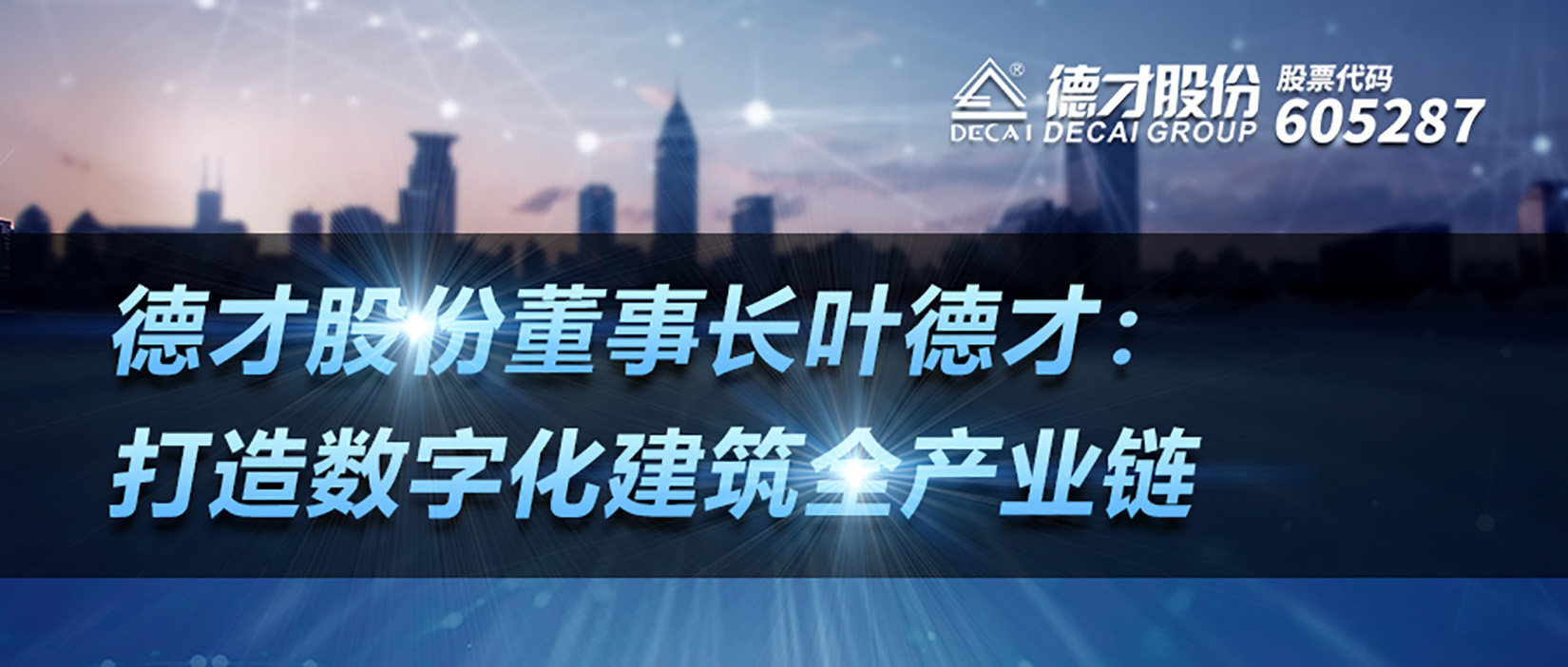Interview by China Securities Journal | Decai Group President Ye Decai: Create a Whole Industrial Ch
2022.09.13

Lately, in an interview themed on “digital construction” with the China Securities Journal, Ye Decai, Chairman of Decai Group, reviewed the outstanding achievements and rich experience in the fields of digital design, new infrastructure, new urban construction and repair of ancient architectural structures, and analyzed advantages in digitalization and whole industrial chain of Decai, the first domestic A-share listed construction enterprise in Shandong Province. As an authoritative and high-end financial information service provider dedicated to providing ongoing authoritative, professional and objective financial and securities news information to investors on capital markets, China Securities Journal believes that Decai has achieved remarkable results in the transformation from traditional housing construction to new urban infrastructure and new urban construction.
According to Mr. Ye Decai, Decai has completed the layout of six centers in London (Design Center), Qingdao, Beijing, Shanghai (East China), Shenzhen (South China) and Chongqing (Southwest China). Riding over the completion of the fundraising project after listing, Decai will become a first-class green and smart sample enterprise of the whole industrial chain in China.
Lately, Decai won the bid for several projects, with its digital architectural decoration design business under ongoing advancement. In a recent interview with China Securities Journal, Mr. Ye Decai said that Decai has formed a full digital design mode of “BIM+VR+AR” and will leverage its whole industry chain advantage to actively participate in new infrastructure, tap into new urban construction, and make efforts to repair traditional ancient buildings. Besides, Decai will also vigorously lay out the field of energy saving and emission reduction, aiming at the market opportunities brought by the goals of carbon peaking and carbon neutrality.
Greater efforts in the field of digital design
“Design level is a core competitiveness of an architectural decoration firm. Decai values design innovation and has been insisting on design-driven for years. As an early enterprise in China applying BIM technology to architectural and decorative design, we have kept a close eye on the application of VR and AR in the field of construction engineering in recent years, forming a full digital design mode of ‘BIM + VR + AR’., said Mr. Ye Decai.
It is said that to create a world-class designer team, Decai established DC HD+Design Institute in London, UK in 2013. By bringing in first-class British designers and letting local designers go global, Decai has been introducing world-class design concepts and pooling world-class design resources.
The application of BIM technology in the whole process of design, construction and O&M has played an important role in improving production efficiency, saving costs and shortening construction period. And Decai has won a number of awards such as “Nest Building Award at the China International Space Environmental Art Design Competition”, “China Construction Engineering Decoration Award”, and “China Decoration Design Award”.
“VR and AR are suitable for architectural decoration design. If BIM realizes the design of three-dimensional space, VR and AR are branching into four-dimensional and five-dimensional space, creating metaverse in the field of architectural decoration.” According to Mr. Ye Decai, Decai has begun the application of VR and AR and after architectural or decoration scheme is designed, in addition to three-dimensional space effect, real scene experience can be enjoyed by various technical means such as intelligent interaction and sensing.
On top of real scene experience at the stage of design, the full digital design mode of “BIM + VR + AR” allows for a significant reduction in the loss of raw materials, shortening of construction period, and traceable and controllable whole process. With the comprehensive advancement of digital building, robot construction is possible in the future.
Simultaneous launch of urban construction, infrastructure and repair of ancient buildings
Under the adjustment of real estate industry, recent years saw a downward growth of output value of traditional construction industry. In this context, leveraging its advantage in whole industry chain, Decai has actively participated in new infrastructure, tapped into new urban construction and made efforts to repair traditional ancient buildings to weaken the influence of periodic real estate market fluctuations.
“New urban construction involves flood control and drainage, landscaping, water, electricity and gas pipelines, elevators, parking lots and intelligence, among others. It features a long business chain in a wide range, so only eligible and strong enterprises can get heavily involved. Our advantage in whole industrial chain built for many years have laid the foundation for us to carry out the new urban construction business in depth.”, said Mr. Ye Decai.
Decai boasts of a whole industry chain covering design, general contracting, decoration, and production and processing of curtain walls, doors and windows. On this basis, a new urban construction model of “1 +3 + N” has been developed. The model contains one platform - Decai whole industrial chain decoration platform, three renovation sectors - comprehensive renovation of old communities, upgrade of supporting facilities in old communities, and upgrade of greening in old communities, and N unlimited evolution capabilities. It allows for whole process participation in the renovation design, construction and landscaping of old urban areas. With first-class qualification for professional contracting of ancient architecture projects and second-class qualification for construction of cultural relics protection projects, relying on the advantage in ancient architecture design, Decai has undertaken a number of projects in recent years, such as Red Sorghum Film and Television City in Gaomi, Jinshan Temple in Zhenjiang, Chongqing Shiba Ti, Tongguan Kiln Ancient Town in Changsha, and Xining Ethnic Style Street.
Judging from the income structure in recent years, Decai has achieved remarkable results in the transformation from traditional housing construction to new municipal infrastructure and new urban construction in the field of general construction contracting. According to the prospectus, the proportion of Decai’s municipal business income increased from 1.62% in 2018 to 10.46% in 2020; and that of housing construction business income decreased from 46.20% in 2018 to 26.73% in 2020.
Promotion of energy saving and low carbon
Insiders pointed out that since the goal of “carbon peaking and carbon neutrality” was put forward, the problems of energy consumption and building carbon emissions in China’s whole construction process have gained more attention, making it extremely urgent to build green and energy-saving buildings and apply new materials to achieve building emission reduction.
Decai has aimed at the market opportunities brought by the goals of carbon peaking and carbon neutrality. Mr. Ye Decai told the China Securities Journal that one of Decai’s fundraising projects is to build an industrial decoration parts production project in Jiaozhou through its subsidiary Qingdao Decai Hi-Tech New Materials Co., Ltd. to improve the industrial chain. In the future, Decai will see assembly construction of such products as doors, windows and curtain walls, which can greatly save raw materials while improving efficiency.
In addition, Decai has begun to explore photoelectric curtain walls. According to Mr. Ye Decai, BIPV (Building Integrated Photovoltaics) is a technology that integrates photovoltaic products into buildings to turn buildings into power stations. Photovoltaic curtain walls integrate such functions as power generation, sound insulation, heat insulation and decoration to reduce carbon and carbon emissions of buildings.
With the first-class qualification for professional contracting of building curtain wall engineering and having won the bid for a number of large-scale curtain wall projects, Decai is eligible for photoelectric curtain wall works, and will branch into this area in due course according to the needs of users in the future.
Looking ahead, Mr. Ye Decai said that Decai had completed the layout of six centers in cities including London, Qingdao and Beijing. With the completion of fundraising projects, Decai’s digitalization level will be further improved and its industrial chain will be more perfect. In the future, relying on Qingdao Headquarters, based in Shandong, laying out across the country and with a global vision, Decai will further enhance the advantage of an industry leader and become a first-class green and smart enterprise in the whole industrial chain in China.
Scanning Qr code sharing





